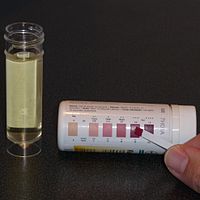
Photo from wikipedia
OBJECTIVE This cross-sectional study examined how the nutritional quality of meals and snacks was associated with overall diet quality and adiposity measures. METHODS Based on 7-d weighed dietary record data,… Click to show full abstract
OBJECTIVE This cross-sectional study examined how the nutritional quality of meals and snacks was associated with overall diet quality and adiposity measures. METHODS Based on 7-d weighed dietary record data, all eating occasions were divided into meals or snacks based on time (meals: 06:00-09:00 h, 12:00-14:00 h, and 17:00-20:00 h; snacks: others) or contribution to energy intake (meals: ≥15%; snacks: <15%) in British children aged 4-10 (n = 808) and adolescents aged 11-18 (n = 809). The nutritional quality of meals and snacks was assessed as the arithmetical energy intake-weighted means of the Food Standards Agency (FSA) nutrient profiling system score of each food and beverage consumed, based on the contents of energy, saturated fatty acid, total sugar, sodium, fruits/vegetables/nuts, dietary fiber, and protein. RESULTS Regardless of the definition of meals and snacks, higher FSA score (lower nutritional quality) of meals was inversely associated with overall diet quality assessed by the Mediterranean diet score in both children and adolescents (P <0.0001), whereas the inverse associations for the FSA score of snacks did not reach statistical significance. The FSA score of meals based on time was inversely associated with body mass index z-score only in children, whereas that of snacks based on time showed a positive association. CONCLUSION Lower nutritional quality of meals, but not snacks, assessed by the FSA score was associated with lower overall diet quality, whereas no consistent associations were observed with regard to adiposity measures.
Journal Title: Nutrition
Year Published: 2018
Link to full text (if available)
Share on Social Media: Sign Up to like & get
recommendations!